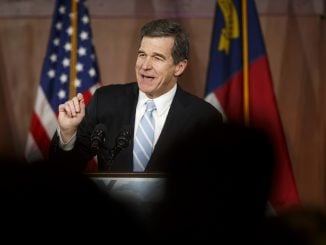RALEIGH — There has been a lot of recent discussion on major wind-energy projects along the North Carolina coast, and the state’s fishing industry has been watching closely to see how any announcements may affect their fisheries.
This year has had a lot of big headlines about wind-power on the N.C. coast. On June 9, Gov. Roy Cooper signed an executive order saying that the state would strive for development of 2.8 gigawatts of offshore wind-power generation by 2030, ramping up to 8 GW by 2040.
Then on Oct.13, there were two separate major developments. At the Governor’s Mansion, Cooper signed a compromise clean-energy bill, which will lean heavily on renewable energy, likely including offshore wind projects. That same day, President Joe Biden’s administration announced a major wind-power plan that would span much of the country’s seaboard, with one of the seven proposed sites being off the Wilmington coast. Biden wants to have 30 GW of wind-energy production in place by 2030, in large part using these sites.
Currently, the projects being proposed do not affect areas of the North Carolina coast that fishermen rely on, but representatives of the state’s fishing industry say they are taking a wait-and-see approach to the impact of any future plans.
“The things that are being proposed right now off the coast of North Carolina, those windmills would not be in an area that we actively participate in fishing,” said Jerry Schill, former executive director and current government relations director for the North Carolina Fisheries Association, a trade organization representing the state’s commercial fishermen. “There might be some transit interest, boats going back and forth, but off North Carolina, it would not negatively affect our fisherman in terms of where they fish.”
Schill said one area that North Carolinians have been affected by windmills is actually far to the north, in New England.
“The ones up north, talking about the wind farms off New England, though they’re not off North Carolina, we have a substantial interest in that area because we have several boats that participate in a number of fisheries up there; the most important in dollar value is the sea scallop fishery,” Schill said.
He said that each permit to fish in these New England scallop fisheries costs millions of dollars, and that “doesn’t include the cost of the boat.” Because these wind farms are more ingrained in areas used for fishing, fishermen there have complained that the turbines negatively impact their work.
Many fishermen are looking to the Responsible Offshore Development Association (RODA) to represent them in Washington, D.C., on this issue, according to Schill. He said they work to prevent wind-energy projects from negatively affecting fisheries and have had some success.
“They’ve been very effective on Capitol Hill and with regulatory agencies letting their views be known,” Schill said. “And there has been legal action on behalf of commercial fishermen up north of here, where it’s definitely going to affect commercial fishing interests.”
NSJ also spoke with Glenn Skinner, the current executive director of the NCFA, on Oct. 26, who reiterated that their organization is not sounding any alarm bells on the issue yet.
“What we’ve been doing in terms of here in North Carolina is we just monitor it and work with anybody to make sure we don’t have an issue, so they’re not throwing this [wind turbines] right in the middle of current fishing grounds,” Skinner said.
Skinner said if they put wind farms in areas they do fish, “we’d see that as a problem if they were going to have a major impact,” and “we’d do whatever we could to address it.” Schill agreed they would “absolutely” be concerned in that case.
Both men directed NSJ to another member of the NCFA, Dewey Hemilright, who has been keeping a close eye on the topic.
Hemilright said there are two main concerns from the fishing industry when windmills go up in areas they fish. One is “being able to have access to the area, particularly if you’re trolling, squidding, scalloping or clamming, and what that effect would be in the area.” The second issue relates to potential difficulty that the National Marine Fisheries Service will have in getting their large ships in the area to do surveys and research. These surveys are vital for regulating the health of fish populations in different fisheries and setting catch-limits and other rules for fishing in those areas.
“There’s a good possibility, and they’ve stated on the record, that some of these areas, they will not be able to access with their vessels because of the structures and close proximity to the structures in that area,” Hemilright said.
A less clear topic is whether the presence of the wind turbines themselves, and any vibrations they create, may negatively impact fishing, as anecdotal reports from further north have suggested. Hemilright said that is “above his pay grade,” and Skinner said he isn’t sure, because “One report will say one thing, and another report will say another.”
Skinner said the main concern on wind energy from his members at the moment is navigation, saying, “if you put a bunch of wind turbines right in the area where you work, that’s a problem.”
The main N.C. wind project at the moment is off of Kitty Hawk in the Outer Banks, but Biden’s announcement proposed another off the coast between Wilmington and Myrtle Beach. The NCFA members said they were not aware of any major issues with either of those projects but would be monitoring any new updates.
“These things take a lot of years, and it’s kind of hard tracking them,” Hemilright said, adding that he just asks that “folks pay attention,” and that anything that negatively affects the fishing industry will also affect those who rely on their products.



